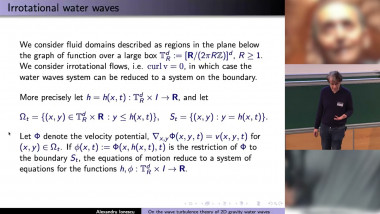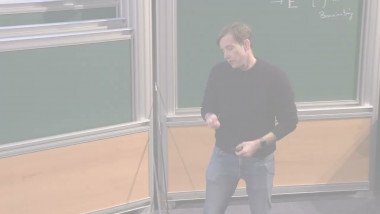
On the Wave Turbulence Theory of 2D Gravity Water Waves
De Alexandru Ionescu

Anomalous Diffusivity and Regularity for Random Incompressible Flows
De Scott Armstrong
De Chuck Newman
Apparaît dans la collection : 2015 - T1 - Disordered systems, random spatial processes and some applications
In this minicourse we discuss some old results concerning the location of zeros of partition functions (or moment generating functions) in certain statistical mechanics models and their possible connections to the Riemann Hypothesis (RH). A standard reformulation of the RH is as follows. The (two-sided) Laplace transform of a certain specific function \Psi on the real line is automatically an entire function on the complex plane; the RH is equivalent to this transform having only pure imaginary zeros. Also \Psi is a positive integrable function, so (modulo a multiplicative constant C) is a probability density function. A (finite) Ising model (with pair ferromagnetic interactions) is a specific type of probability measure P on the points S=(S_1,. . . ,S_N) with each S_j = +1 or -1. The Lee-Yang theorem implies that that for non-negative a_1, . . . , a_N, the Laplace transform of the induced probability distribution of a_1 S_1 + . . . + a_N S_N has only pure imaginary zeros. The big question here is whether it's possible to find a sequence of Ising models so that the limit as N tends to \infty of such distributions has density exactly C \Psi. The course will focus on questions of this sort. Here are some background references: C. Newman, Z. f. Wahrschein. (Prob. Th. Re. Fields) 33 (1975) 25-93 (see, esp. p. 90) C. Newman, Proc. Amer. Math. Soc. 61 (1976) 245-251 C. Newman, Constr. Approx. 7 (1991) 389-399 A. Odlyzko, Num. Algorithms 25 (2000) 293-303
